Ministry among the rank and file: Brandon Denning’s service to God and country
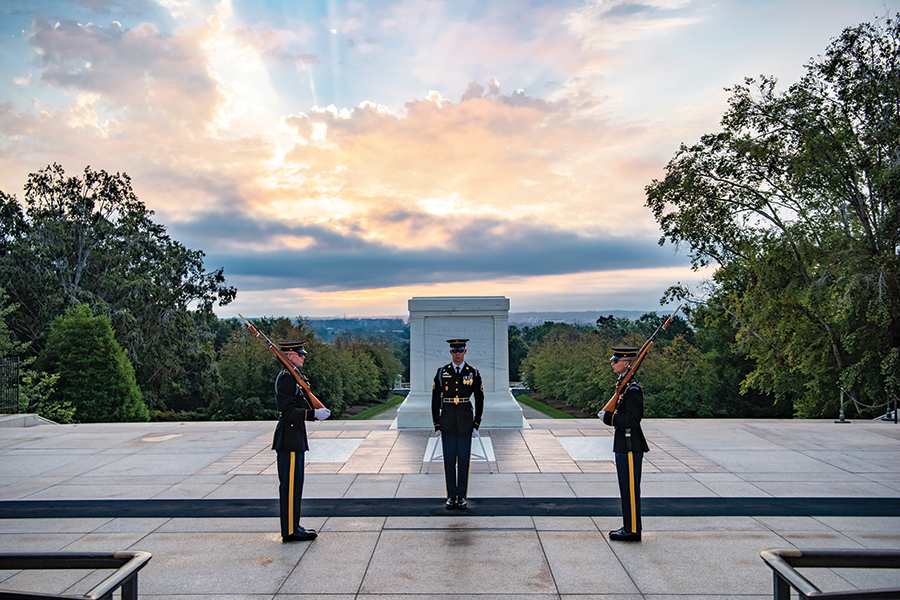

Editor’s note: this article appears in the Spring 2022 issue of Southwestern News.
On the Virginia side of the Potomac River, overlooking Washington, D.C., and the nation’s tributes to the fallen of World War II and the Korean and Vietnam wars, Arlington National Cemetery serves as a silent reminder freedom comes with a cost.
Opened in 1864 by the then-War Department as the nation’s military burial site, the cemetery is the final earthly resting place for over 400,000 of the country’s active-duty service members, veterans, and their eligible dependents dating back to the Civil War. On carefully placed white grave markers that make up the cemetery’s perfectly lined rows, the names of men and women who have worn the flag of the United States as a member of one of the five branches of the military are etched in capital letters on each of the tombstones.
Except one.
In section 48 of the cemetery, resting at the top of the stairs leading to the east side entrance of the cemetery’s Memorial Amphitheater, is the Tomb of the Unknown Soldier. The most iconic of all of Arlington’s memorials, the tomb’s sarcophagus bears no name. Engraved on the tomb’s west side panel are the words, “Here rests in honored glory an American soldier known but to God.”
Dedicated on November 11, 1921, the third anniversary of the conclusion of World War I, the tomb is an official military post and, since 1948, has been guarded 24-hours-a-day by a special group of guards from the 3rd U.S. Infantry Regiment — “The Old Guard.”
The memorial site is a solemn and quiet place as visitors reflect on military service while watching the sentinel on duty take 21 measured footsteps before pausing for 21 seconds, turning to face the tomb for 21 seconds, and turning to repeat the pacing as he stands guard over his fallen comrades’ remains. The lone sounds come from the steel shank on the inside of the heels of the sentinel’s shoes that enable the soldier to “click” during certain movements, such as the changing of the guard. The respect and dignity warranted at the site are unspoken, though signposts serve as muted reminders and military personnel serve as verbal reminders when necessary.
Though almost 700 men and women have been awarded the Tomb Guard Identification Badge (TGIB) since counting began in 1958, only one person has served as a member of The Old Guard and returned as a chaplain to the guard unit: Chap. (Maj.) Brandon Denning, a 2008 Master of Divinity graduate and the 453rd guard at the Tomb of the Unknown Soldier.
Growing up in South Mills, North Carolina, Denning had “no real aspirations at the time to go into ministry or the military.” Though he made the decision to follow Christ as a 13-year-old, he says he began to ask questions about his faith “because I wanted to be serious about following the Lord.”
Following high school graduation, Denning enlisted in the United States Army. The U.S. Army’s 1990s recruiting slogan, “Be all that you can be,” inspired Denning, but so did stories of his grandfather.
Roy Denning, an Army Technical Sergeant (TSgt) who served in World War II, was responsible for transporting U.S. servicemen to the beaches of Normandy for the D-Day invasion on June 6, 1944. Though he passed away before Denning was born, the younger Denning was motivated to serve his country, specifically through the Army.
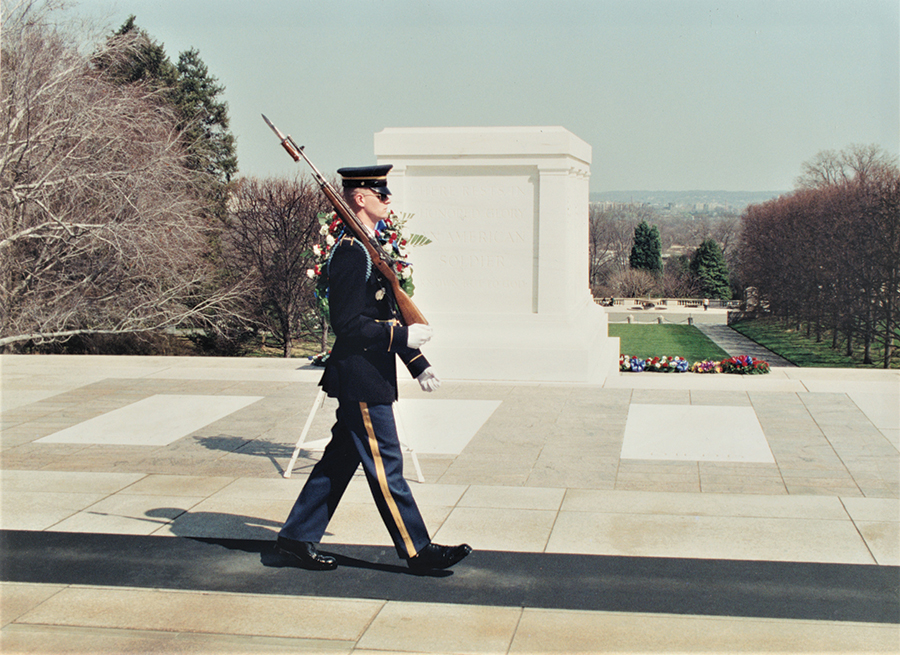
After Denning began his time of service in the Army in May 1996, assignment at the Tomb of the Unknown Soldier was not automatic but required try-outs through a rigorous initial selection process that included height and weight requirements, a high score on physical fitness, and a security clearance due to proximity to dignitaries who visit the site. Once these standards are met, sentinel hopefuls then visit Arlington’s grounds in groups for further testing.
“There are trials twice a year and you went and tried out and if you did not pass the requirements at any point, they failed you,” Denning explains.
When Denning went with his group of seven comrades for try-out at Arlington in 1996, the group was tested in three areas: history of the cemetery, military uniform, and the “manual.” Each of the areas is graded and “it’s very much of a mental kind of game that you have to go through” as candidates must memorize the locations of fallen soldiers and dignitaries, as well as the history of the cemetery, keep their uniform to the Sentinel Creed’s standard of perfection, and do all actions according to the manual for service as a sentinel, including walking, timeliness, and other standards.
“The idea is for us to give our best to the unknowns,” Denning explains. “Everything is very rigid and meticulous.”
Only two soldiers were selected as sentinels in 1996, and Denning was one of them.
While calling the opportunity to serve as a sentinel “very rewarding,” Denning says the time he spent as a guard, from 1996-1999, gave him the perspective “that life is fleeting [and] there are sacrifices that have to be made for our freedom.”
Denning correlates “a lot of the Tomb of the Unknown Soldier to the sacrifice that our Savior has made for us on the Cross,” though he is careful not to take the analogy too far.
“I think we have to realize that life is about sacrifice and sometimes we are going to be called to sacrifice for the greater good and that’s exactly what those soldiers represent,” an emotional Denning explains. “They lost everything, to include their identities, and that is something this country nor I should take lightly.”
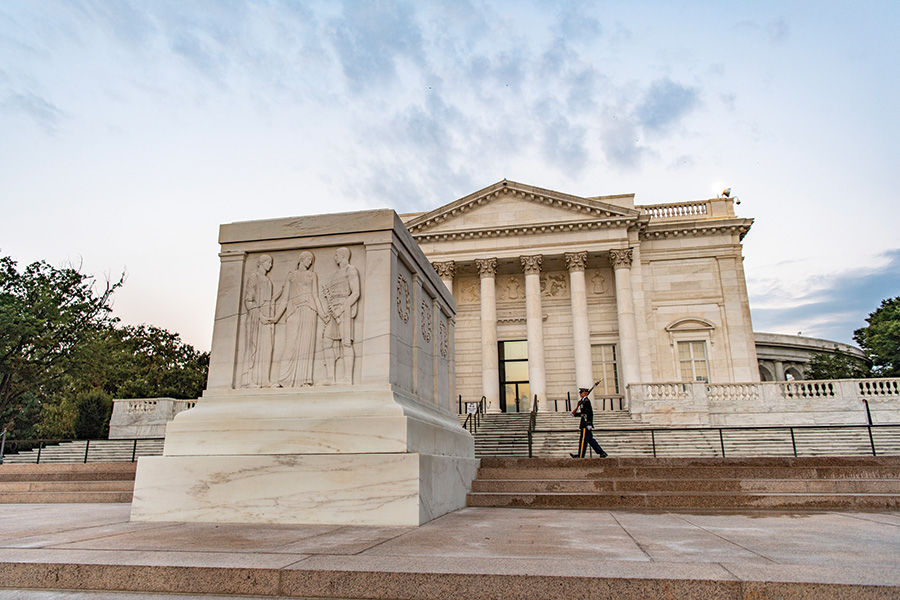
The site as it is known today was built in 1926, with the remains of the World War I unknown soldier buried under the sarcophagus. The crypt in front of the sarcophagus is divided into three sections and holds the remains of U.S. soldiers from World War II, the Vietnam War, and the Korean War. In 1998 DNA testing identified the remains of the Vietnam Unknown serviceman.
“I had the honor in 1998 to guard the Vietnam Unknown while his remains were being removed for DNA testing and identification and later be a part of the ceremony,” Denning says. “Twenty-four years later, words cannot express the emotion of witnessing Air Force Cpt. Michael Blassie identified as the Vietnam Unknown Soldier and returned to his family and given the proper funeral he deserved. It was a great privilege to guard Cpt. Blassie and maybe be a part of helping restore honor to the brave men and women who did what their country asked of them in Vietnam.”
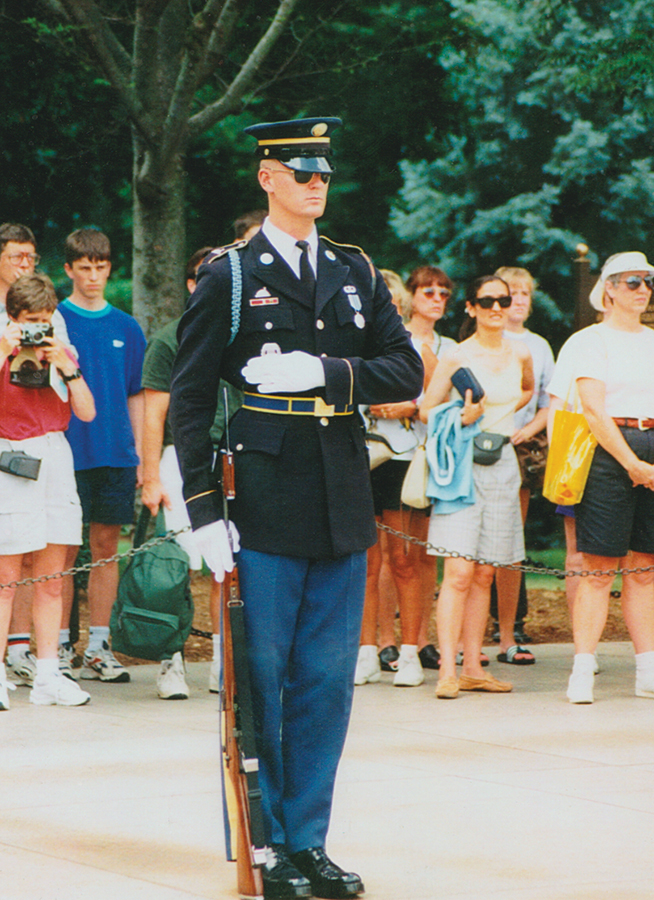
Though he “was successful in the Army, by the world’s standards,” Denning explains he was “really falling apart spiritually.” He says it is one of the reasons he “got out from a first enlistment” in 1999.
He enrolled as a student at the University of Tennessee at Chattanooga and the singles’ pastor at the local church, who was also a friend, began to mentor and disciple him. During this time Denning “was wrestling with a call to ministry” but had “no plans of coming in as a chaplain.” However, his friend took him around to visit seminaries and Denning landed in Fort Worth at Southwestern Seminary, calling it “one of the best places that I visited.”
When Denning originally began as a seminary student in 2004, he was focused on counseling. However, a change in the program was the “conduit” that led him to begin working on a Master of Divinity degree with biblical languages and a concentration in pastoral counseling. While he was a student, Denning was exposed to the ministry of chaplaincy and “appreciated the mixture of the academics and the practical side of ministry” that professors taught him. As a student, Denning was a chaplain at the fire department in Edgecliff Village, located near Seminary Hill.
Denning explains the results of his education at Southwestern are two-fold. His courses provided a foundation for ministry as he learned doctrinal understanding of the basic tenets of faith, but he was also compelled to continue learning.
“I think a great school is one that encourages you to continue your education long after you have graduated,” he says. “That is exactly what Southwestern taught me. I felt like I had a great education at Southwestern. It really prepared me not only to minister in the real world, but also to pastor a church.”
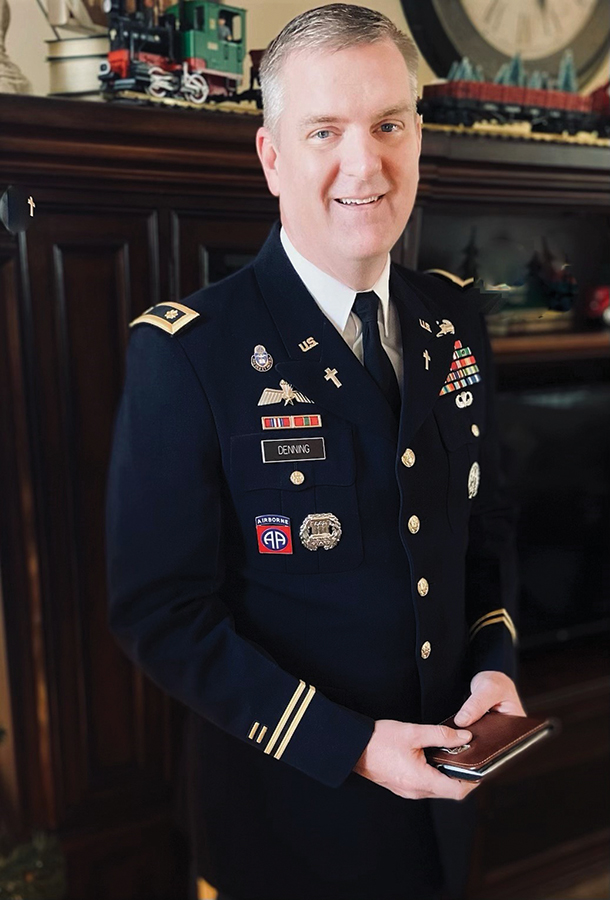
Following graduation from Southwestern in 2008, Denning was commissioned as a chaplain in the Army and assigned to the 82nd Airborne. He had heard how chaplains helped one of his Army comrades who had been injured in Iraq and the friend encouraged Denning to pursue military chaplaincy.
Denning became a student at what is now known as the U.S. Army Institute for Religious Leadership located in Fort Jackson, South Carolina, in 2009. At the time the U.S. Army was in the process of a surge in Afghanistan and, following chaplain school, he was deployed to Afghanistan with the 4th Brigade of the 82nd Airborne. After his 2009-2010 deployment, he returned to Fort Bragg in Fayetteville, North Carolina, and was reassigned to Arlington National Cemetery.
For six months Denning conducted funerals at the cemetery until he was reassigned as chaplain to the 4th Battalion – the battalion in charge of the Tomb of the Unknown Soldier, a role he served in for three years and that he calls “a great fit” and “a real joy.”
Denning values the role of military chaplains as they help soldiers who have questions about life, death, and suffering.
“I think that an individual’s spiritual life, whether they want to recognize it or not, is important,” he explains. “Something as simple as where we come from and where we’re going are theological questions, … whether we realize that on the surface or not. Those are all questions we all are looking for answers to and it’s the military chaplain that can kind of help with those questions and help someone as they’re faced with those types of questions in life, especially when faced with death and suffering. They move to the forefront of a soldier’s mind fairly quickly.”
Today, Denning uses the lessons he learned at Southwestern, coupled with his hands-on experience, to serve as an instructor of homiletics at the U.S. Army Institute for Religious Leadership in Fort Jackson, where he instructs the Army’s incoming chaplains in the areas of teaching and preaching.
Currently, there are over 3,700 chaplains endorsed by Southern Baptists through the North American Mission Board (NAMB)–approximately 1,500 of which are military chaplains.
“The chaplaincy is a unique and specialized ministry that operates outside the walls of the local church,” says Chaplain (Maj. Gen.) Douglas Carver who currently serves as the executive director of chaplaincy for NAMB. Carver explains the role of chaplains as a “ministry of presence” that is reflective of the love and compassion of Christ.
“Chaplains have an inherent value to the ministry of church in the fact that they deploy into places where the church has limited or no access—behind the walls of prisons, beside a police officer in their patrol car, in a combat zone with their troops, on the wards of hospitals and medical centers, inside the cordon of a disaster site, or at a corporate staff meeting with their CEO,” Carver explains. “Regardless of the institutional setting, chaplains have one primary mission: to share the Good News of Jesus Christ with those fighting for their lives, seeking forgiveness or reconciliation, facing the fear of life or death, or looking for hope in a hopeless situation.”
Carver, who previously served as the 22nd chief of chaplains in the United States Army, calls Denning “one of our best not only in the SBC, but in the entire military chaplaincy” noting in his ongoing ministry “Chaplain Denning continues to faithfully represent the Lord Jesus Christ and Southern Baptists as he shares the Gospel with soldiers and their family members.”
For his part, Denning seeks to be faithful as he teaches the next generation of Army chaplains to be “real with people” and “genuine about who they are in the Lord” and as human beings. Through his 20 years of ministry experience and 17 years of military service, Denning says there is one “foundational” concept to have “if you want to be able to relate to others and be able to relate God to others.”
“There are a lot of things that we focus on here at the school,” he observes. “Ultimately, it’s bringing God to soldiers and soldiers to God. But in order to do that, I truly believe that we have to be comfortable with our relationship with God and our relationship with who we are as people or as a person and who God made us to be.”
As Denning reflects on his service as a guard at the Tomb of the Unknown Soldier and his current ministry training military chaplains, he recognizes “death is something that most soldiers don’t consider, but it is shockingly final and it hurts…it really stings.”
Denning explains tomb guards memorize a lot of poetry related to honoring the dead, including a poem written by 1948 medal of honor recipient, and East Texas native, Audie Murphy. The late World War II hero’s poem reads, in part,
“I hear no protest from the mute lips of the dead;
They rest, there is no more to give.”
“Audie Murphy was right in some sense,” Denning concludes. “We do not hear the mute lips of the dead and there is no more that they can give. However, death doesn’t have to be this final. The Apostle Paul also wrote a poem to the church of Corinth:
‘Death, where is your victory?
Death, where is your sting?
But thanks be to God, who gives us the victory
through our Lord Jesus Christ!’”
Ashley Allen (’03, ’09) is managing editor of Southwestern News.
Photos for this article were provided by the Denning family and Arlington National Cemetery.



